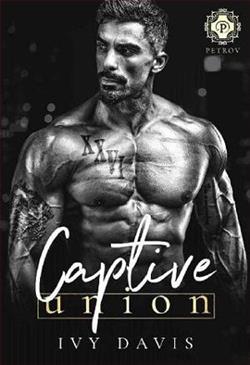Page 22 of The Secret Word
Lady Fernvale smiled somewhat absently at Clem, and commented, “Are you making your debut, my dear? I must be becoming more absent-minded than I thought, for I do not believe I have seen you.”
“Indeed I am, my lady,” Clem replied. Chris was correct again. The Season was as ruled by hierarchy as everything else the ton did, and Clem had only had access to the lower levels of events.
“She and her escort are friends of John Bagshaw, Lady Fernvale,” said her hostess. “And very amiable people, I have found them. Miss Wright quite agrees with me that tonight’s Count Balsario is the scariest either of us has ever seen.”
Clem did not point out that her life total of Counts Balsario was the one present tonight. It would be rude, and was beside the point, besides.
“He is deliciously evil, is he not?” Lady Fernvale agreed. “Your escort, Miss Wright. What is his name, my dear?”
There was something curiously intent about her as she asked the question, and for a moment Clem toyed with refusing to answer. But of course, their host and hostess knew the name, and Lady Fernvale would find it out soon enough. “Christopher Satterthwaite, my lady,” she replied.
“I knew it!” Lady Fernvale leaned forward in her chair. “The son of Reginald and Christabel Satterthwaite.” It was a statement, but the lady’s raised eyebrow made it a question.
“I do not know his mother’s name, my lady, but his father’s name was Reginald.”
“My mother’s name was Christabel,” said Chris, who had entered the box unobserved, just ahead of Bagshaw and Lord Thornstead.
“Christopher Satterthwaite,” said Lady Fernvale, standing up so she could study Chris as intently as she had been looking at Clem. “My dear Christopher, and I may call you that, my dear, for I knew you when you were a babe in clouts. I do not suppose you recognize me?”
She sounded so hopeful that Clem hoped Chris could answer in the affirmative. He didn’t, quite, but he took another look at the lady and looked thoughtful. “I think… I am sorry, my lady. You seem familiar, but I cannot imagine where I might have met you. Did you know my parents?”
The lady looked around at the rest of the company, smiling even as tears welled in her eyes. “You must think I have lost my mind. Please forgive me. Mr. Satterthwaite is the son of a very dear friend—my closest friend of my girlhood. Chrissie Thurgood died far too young, and I have not seen Mr. Satterthwaite since her death, even though I am his godmother. Indeed, until this evening, I believed you to be dead, Christopher. Or, I should say, at first, I thought you had gone overseas with your grandfather after your father died. But you did not, did you? For he returned six months ago, and you were not with him.”
Her emotions overflowed, and she took both of Chris’s hands, clung to them, and looked up at Chris though her tears. “But here you are, alive, my dear, and looking magnificent. Did you go with your grandfather after all? Wherever it was he went?”
Chris was shaking his head. He looked dazed, as if he had received a blow to the head.
He needed a rescue, so Clem gave him one. “Lady Fernvale, may Mr. Satterthwaite call on you tomorrow? This has been a shock to him, as it has been to you, I am certain.”
“Yes,” said Lady Fernvale eagerly. “Will you call on me, Christopher?”
Chris felt inside his coat and pulled out a stub of pencil and a small notebook. “Tomorrow afternoon, my lady? Shortly after two?”
“That will be wonderful,” said Lady Fernvale. “Oh, Christopher. I do not know whether I am on my head or my heels. I am so happy! Excuse me, Lady Thornstead, for intruding. Good evening, Miss Wright, Lord Thornstead, Mr. Bagshaw. Tomorrow, Christopher. I shall be looking forward to it!”
The bell rang to indicate that the second act was about to start, and they all took their seats again. Clem could not sink back into the story again, though, as she had before, for she could not help wondering whether, if Chris found his way back into his rightful world, he would still want to take on the bother of Clem’s domineering father for the sake of marrying Clem and her dowry.
*
Grandfather was back.Chris had hoped that Lady Fernvale—‘Aunt Fern’, as he had apparently called her when he was a child—was mistaken, but Grandfather had actually called on Lady Fernvale, hoping she would be able to give him news of Chris.
“He thought his brother might not have wished to have kept you, dear Christopher, but that he would have sent you to the Thurgoods, your mother’s people. Of course, Mr. Satterthwaite—Mr. Percival Satterthwaite—knew he could not call on them. Not after how he and his son—your father—deceived them so as to trick Christabel into marrying Reginald.”
Chris remembered his father speaking of romancing his mother off her feet, but not deceiving her. That didn’t sound good. It fit his father’smodus operandi, though, and his grandfather’s. Clem, who had agreed to come with him, squeezed his hand. He looked down surprised to see their fingers twined. He had not even been aware they were holding hands. Even so, it bolstered him and gave him courage he didn’t know he needed. “Instead, my great uncle put me out into the street,” he said.
“Oh, dearest boy,” said Aunt Fern, her eyes filling again with tears, though she had sworn three times in the past half hour that she ‘was not a watering pot.’ “Darling, your cousin’swife told me that your grandfather tried to leave you with them, but that they refused. They thought you should be your grandfather’s responsibility since he was the person that you knew. A grieving boy, you know.”
Chris, who had always done his best not to think about that day, had a sudden memory. “My grandfather and the man who looked like him argued, but in the end, grandfather took me to the other side of the square, where our carriage waited. Then he gave me my bag and told me to return, and to knock on the door. He said he would wait until I was safely inside. But he didn’t, Aunt Fern. The person who opened the door told me to go away, and when I looked for Grandfather, he was gone.”
His face was wet. It had been wet then, too, he remembered.No. Not remembered.What was happening to him now as he recalled that moment was stronger than that. He was that boy again, running frantically in the direction the carriage had been heading, calling out for his grandfather, longing for his mother, who had been in her grave for two years, or even his often absent but always cheerful father, whose funeral had been only the day before.
After he’d given up the chase, he’d thought of returning to his great uncle’s, but the angry voices between the brothers, the cold rejection from the butler—he could not face it. He had wandered and cried, cried and wandered, until he fell in with a gang of street rats, who robbed him of his bag and all his possession, then—with careless kindness unfathomable then and even now—gave him some rags to wear and took him home with them.
Their voices echoed in his mind, their cant almost unintelligible to his ten-year-old ears. In English, it went like this.
“Here! What are you crying for?”
“Because my grandfather has left London without me.”















